What Does It Mean to Be Palestinian Now?
After October 7, this question has become a matter of grave importance, amid crackdowns on free speech and protest. Five writers reflect on the state of Palestinian life today.
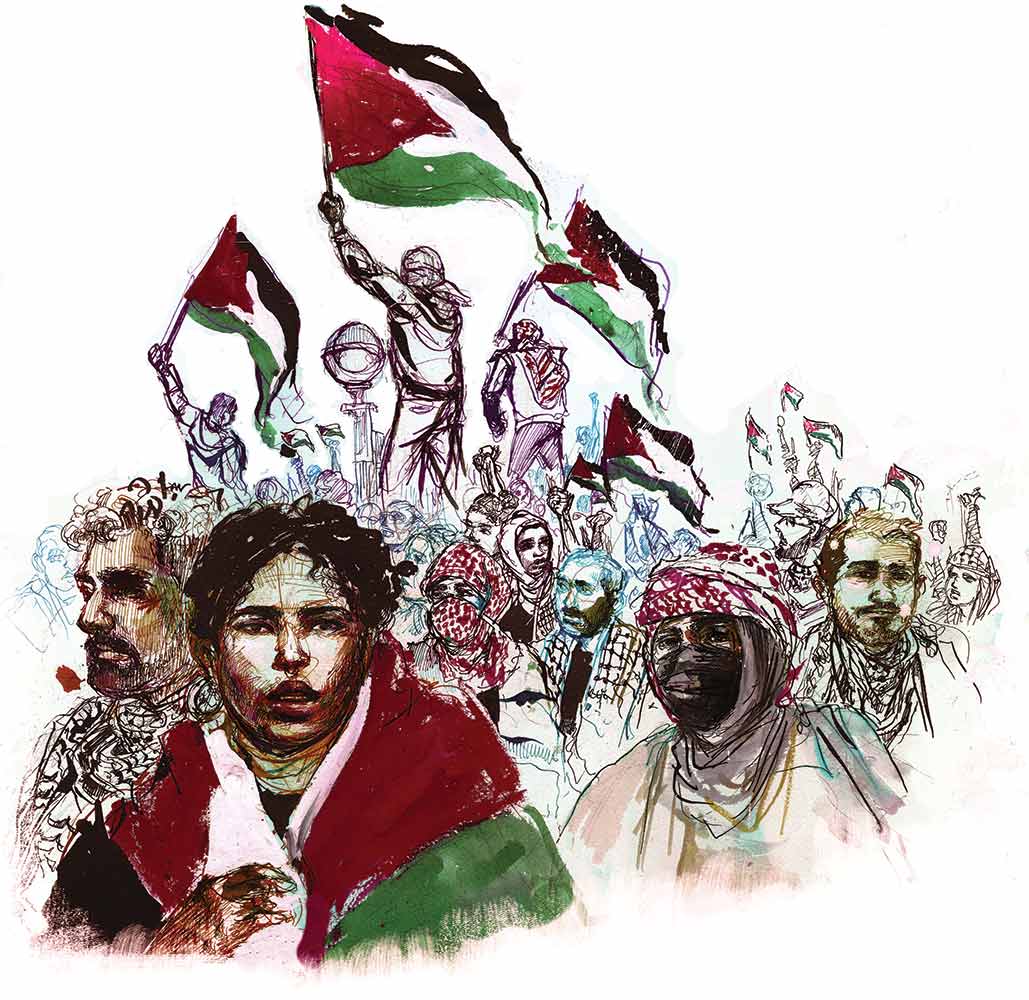
For generations, the voices of Palestinians have been routinely overlooked. When we do turn to them, it is usually to ask them to justify their despair or prove their worthiness as humans—and to teach us the very basics of a generations-long crisis of forced exile and violent displacement.
Instead of making Palestinians play out that endless cycle one more time, we wanted to get to the heart of a question that feels more vital, more essential, in our moment.
The contributors to this section are Palestinians living in the US, where the war reverberates with terrifying intimacy even though the bloodshed is thousands of miles away. It is also where the need to hear from Palestinians—and to listen to what they have to say—has never been as critical, or as fraught.
So what does it mean to be Palestinian now? It’s a question whose answer we know will keep changing in the months and years ahead. But we have to keep asking it.
—The Editors
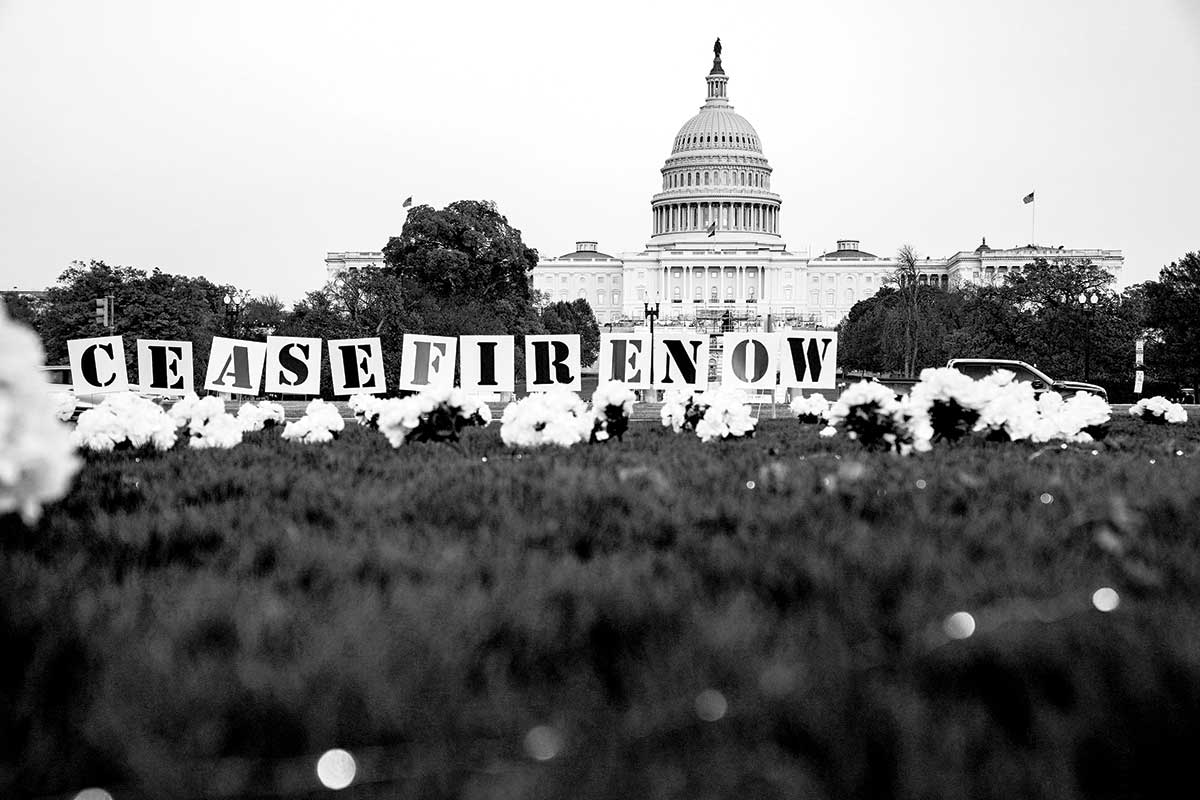
A Day in the Life
Noura Erakat
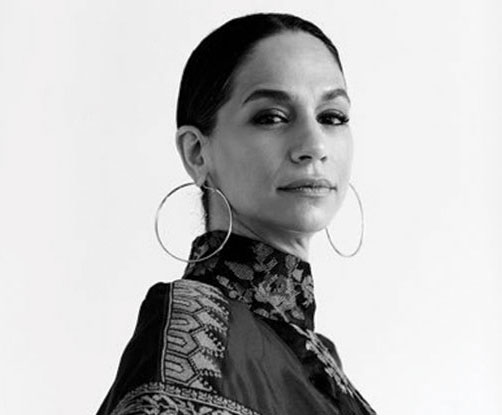
It’s the sound that guts me. The mama grasping her baby boy wrapped in a white shroud, moaning in shock. A little girl curled up next to the wheels of a stretcher holding her father. Between her cries, we hear her implore, “Baba!” There is also the father with skinny arms, still in his slippers, covered in ash, screaming his children’s names one by one. He turns over a piece of shattered concrete searching for his babies, but there is nothing but wreckage.
Palestinians are certainly not the first people to endure genocide, but they are most certainly the first to have it broadcast in real time. How pathetic that we can’t stop this. Every night I make a single wish: Please let us wake to news of a cease-fire. But in the morning, when I pick up my phone, I already know what I see will keep me up another night.
I’m barely up, and my phone is already ablaze with requests. I won’t be able to respond to all of them. My title—human rights attorney—gives the impression that I have a law practice. A Palestinian family from Gaza has arrived in Cairo; 46 members have been killed. They want to sue Israel and need help. A journalist friend writes from Gaza. His employer is demoting him for being “anti-Israel,” as he and his family scramble to find food and shelter. What can he do? I frantically try to respond. It never feels like enough.
Besides work and protests, I only leave home for my daughter’s sake. She always asks me to put away my phone. She explains her poor test score is a result of her baba and me “talking about the war too much.”
I broke my self-imposed isolation to take her to a school Halloween party. I joked with one of the parents that my costume was a Palestinian pretending to be OK. She didn’t laugh. Ever since 6-year-old Wadea Al-Fayoume was stabbed 26 times by his family’s landlord, I have been acutely afraid for my daughter’s safety and anxious that my public-facing work could cause her harm. I stay in costume and pretend everything is OK.
I marvel at the sky: How lucky we are it does not fall and crush us without announcement.
The requests for comment from journalists and TV producers start to pile up. I wade through them on my commute to campus. I’m usually calm with the media, but these days I’ve been livid about their coverage and exhausted by the cable networks that have blacklisted me or refused to post my interviews. A TV producer who invites me to appear on his show several times but then never has me on writes to share that he is “trying to connect with Hamas leaders Ghazi Hamad and Osama Hamdan.” He asks, “Do you have their contact info?” I am boiling.
In my pre-interview prep with the BBC, a producer asks me how Palestinians feel about Hamas, and I snap: “You know that’s a racist question, right?”
“I’m just trying to help,” she says, “because not all Palestinians are Hamas.”
“What does it matter what Palestinians feel? Their ideas don’t alter their civilian status; nothing justifies a genocide. You’ve never asked a single Israeli what they feel about their government. You didn’t even ask if Americans supported Bush when his administration invaded Iraq…”
“OK, thank you. I’ll talk to the team and get back to you.”
I know she won’t call back. So I send a text suggesting other Palestinians she should call. I’m so mad at myself that I may have lost this opportunity for Palestinians to be heard.
In class, I walk a tightrope. I want my students to ask me about what’s happening. I want to tell them how lucky we are to have classrooms, how hundreds of schools in Gaza have been destroyed or turned into makeshift shelters and 100 percent of the students don’t have access to education, how “too much reading”—their standard complaint—is a wonderful problem to have. But no one asks. They are reluctant to speak in a charged environment. So I open space for them to share. At the very least, discussing Palestine will not be a taboo.
In our critical race theory class, we’re covering the last chapter of Ruth Wilson Gilmore’s Golden Gulag. My voice cracks as I read to them: “If the twentieth century was the age of genocide on a planetary scale, then in order not to repeat history, we ought to prioritize coming to grips with dehumanization.”
Popular
“swipe left below to view more authors”Swipe →Though my university likes to boast about its faculty in the news, it has avoided mentioning me for the past three months. I’m grateful it’s not worse. Despite 12,000 complaints and congressional interventions, our teach-in on “Race, Liberation, and Palestine” in early December was not canceled. Meanwhile, at UPenn, donors are calling for the resignation of my colleagues for chanting for freedom “from the river to the sea.” At Harvard, protesting students have been doxxed by roaming trucks plastered with their faces and names. Our Students for Justice in Palestine chapter became the first to be suspended at a public university. Suspensions, punishments, and threats mount at nearly every campus in the country.
After the last student leaves, I put down my mask. I pretend to be OK here, too.
On my commute home, I take calls: about a campaign to address the United Nations’ inefficacy from within; about a nascent effort to organize artists; about legal strategies to supplement and amplify our International Criminal Court petition… I’ll never be able to respond to everyone.
Once home, I rush to set up a makeshift studio for a live TV interview. Even before I am done, the angry e-mails are pouring in.
“Poor Hamas, right? You are a morally depraved black hole.”
“You are like poison…. Thank goodness my children are not exposed to you.”
“Go to Palestine so we can kill you too.”
I also receive remarkable messages. People around the world, enthusiastically supporting freedom, who ask over and over again: “What can I do?”
I’m late again. I rush to pick up my daughter, who is embarrassed by my tear-stained face. She likes to joke that I sound the same when I laugh and cry. That always makes me laugh. At the park, we find the sidewalk colorfully chalked with the words “Kids say no to genocide.” My heart pops with the promise of the generations to come.
The evening is filled with Al Jazeera Arabic, a refreshing reprieve from US media coverage. I tape a podcast, jump on an emergency Zoom. More e-mails come in, more speaking invitations, some that I know will be canceled. History didn’t begin on October 7, so why are we asked to teach everything from scratch again?
It’s past midnight. I get into bed and back on my phone. I witness and listen intently. I cry with my eyes shut, and I wish to wake to the news of a cease-fire.
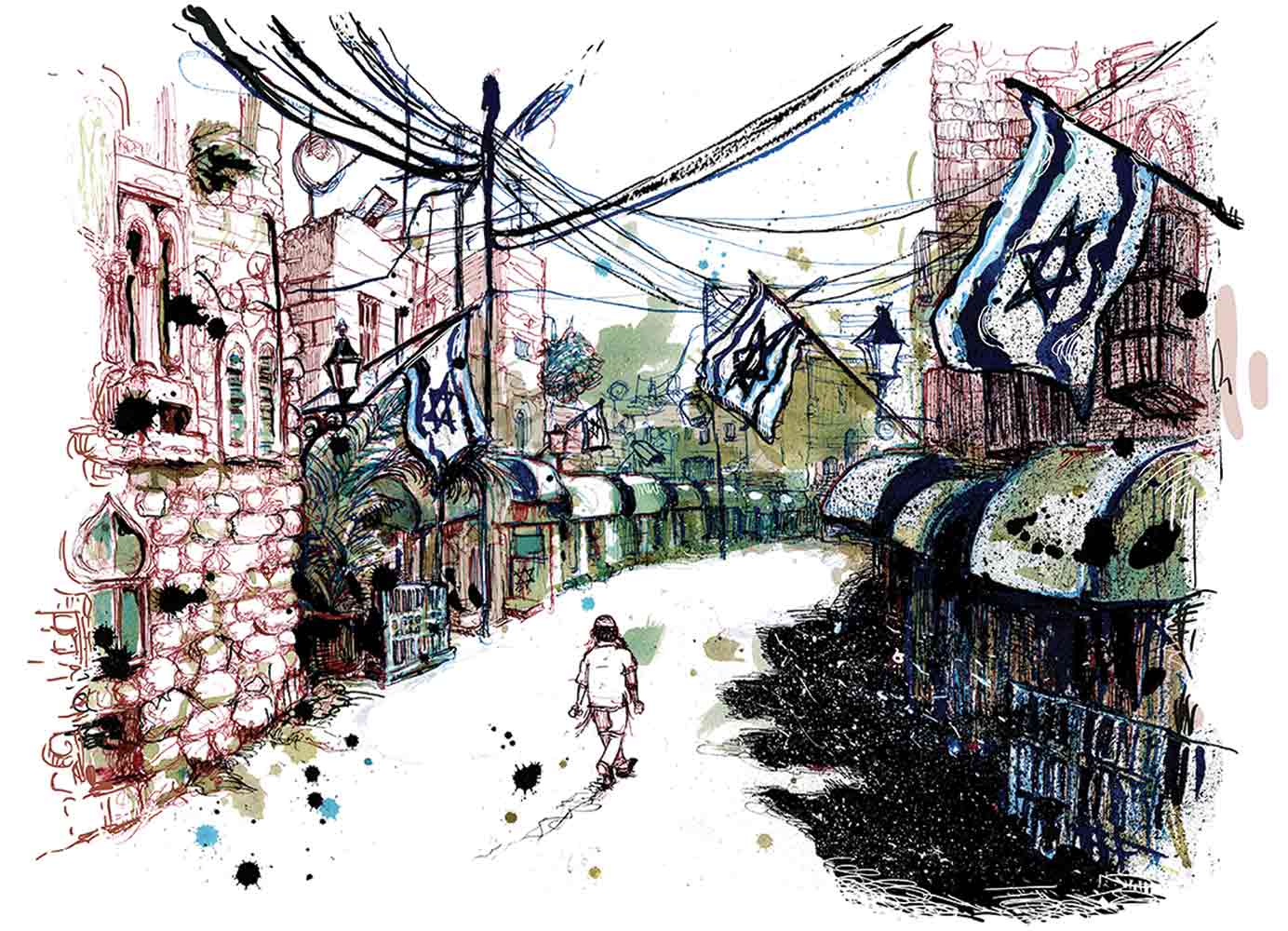
We Were Children Once
Ahmed Moor
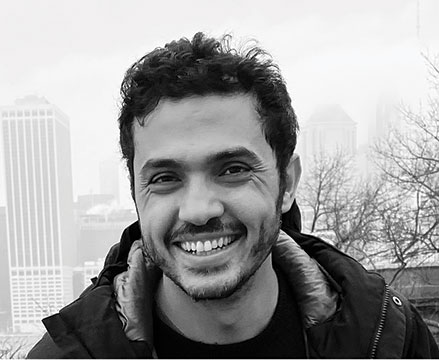
Anyone who has been to Gaza knows it’s a place of children. They are everywhere. Little girls and boys underfoot, in the streets, arrayed on sandy curbs. They reach into your pockets and make fun of you. Boys on carts pulled by donkeys, peddling goods in tattered clothing and barefoot, baked brown by an unrelenting summer sun. That’s the Gaza I remember.
I was born in Rafah in 1984, in the refugee camp there. My family moved when I was young. My father, an orphan who started kindergarten at an UNRWA school at the age of 9 and worked as a child porter for Egyptian soldiers before picking oranges in Israel after 1967, got us out. He finished school and university in Beirut—the only passport available to the Palestinians, then and now—and secured a job with an American NGO. But we went back to Gaza every summer until I was 15, when the Second Intifada started. I haven’t been back since.
My earliest memories of Gaza: I remember summer evenings fragrant with jasmine, bright with the Milky Way and the sodium lights of Rafiah Yam, the nearby Jewish settlement, a different kind of bright, searing against the darkness of the Strip. I remember rushing off into the night with other boys, to build plastic bonfires in the dunes and smoke dried molokhia stems, pretending we had cigarettes. And by day, sledding down those same dunes on discarded corn oil containers.
I remember the summer a boy was buried alive when a dune collapsed in his wake. An apocryphal story, or a portentous one…
I remember trudging through the sandy lanes with my mother to the local telephone operator to call my father, who could rarely join us on those trips home. And I recall, years later, the thrill of watching as the first crew of laborers built a network of telephone exchanges in our corner of Gaza. I remember riding my bike past those high dunes, past Rafiah Yam, and through the checkpoint where Israeli men, armed then, as now, to the teeth, plied small cruelties for fun. I remember “Shlomo’s bar” on the beach, which served Palestinian laborers Heineken beer in glass bottles. The prickly pear groves with their fruit—so much like Gaza—sweet, but too often painful.
The dunes are gone now. The sand was used for cinder blocks, the ubiquitous building material in Gaza, where the number of small children has only grown with time. My memories come back to me, relentlessly, with the force of guilt and loss, as I watch the videos of what’s being done to those children, more than 10,000 of them now. In one, a cameraman sweeps past a collection of small feet, the only visible parts of small bodies, crushed to death under a collapsed roof in Gaza as they slept. The dunes of my youth turned to cinder blocks, children buried alive under their weight. A timeless story for the children of Gaza, not apocryphal at all.
Lately, I catch myself thinking strange thoughts. I imagine a dying sun, eight billion years from now, swallowing the earth and turning everything to ash. I know I am not alone, and I recognize the dark fantasies of a broken spirit.
And then my children, alive, beautiful, and vivacious—three little girls—wake me from my grim reveries. They pull me back from the precipice. Unknowingly, they hold the genocide at bay. They are too young to know what’s being done to their family, so far away from everything in their lives. I write this love letter to Gaza’s children, whose lives are brief and whose deaths are meaningless. I write this letter for all the people in Gaza, who were children once, if only briefly, before the awareness of their own worthlessness crept into their lives. I write this letter for myself, and I wonder, when all the children in Gaza are dead, who will pull us back from the precipice?
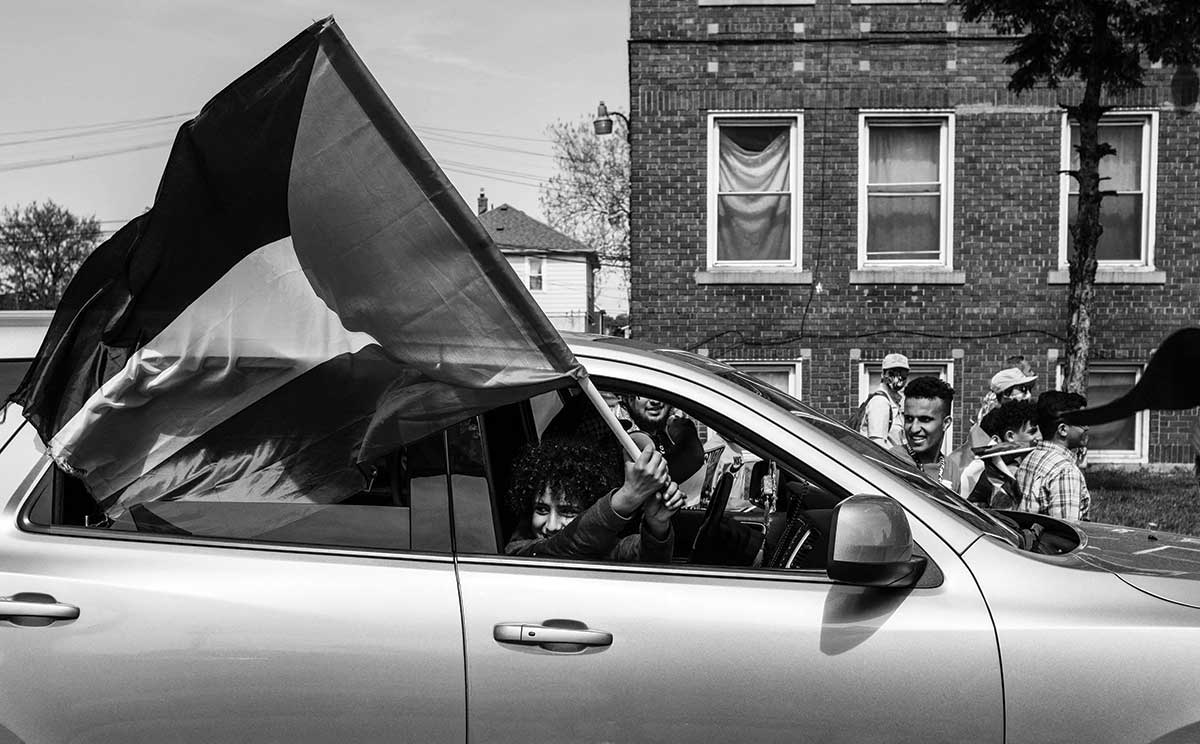
Occupied by Hope
Noor Hindi
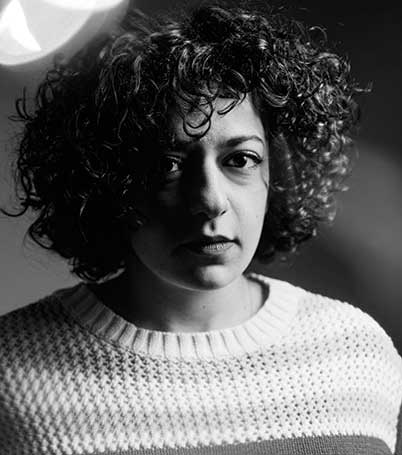
Recently, I asked my father a simple question: “Is there hope?”
I was standing in my kitchen in Dearborn, Mich., slicing mangoes. Peering through the doorway, I saw him as I’ve always seen him: squinting at his phone, his body collapsed on a couch, a tired look on his face.
He had already turned on the news.
I have never been to Palestine. But the chaos of headlines about our homeland is something I am all too familiar with. So is the history that haunts us.
As a child, I was lulled to sleep by the sound of Al Jazeera as I lay on my father’s lap. At family gatherings, I listened to our stories: my grandmother surviving the Nakba at 5 years old; my father’s upbringing in the Qalandia refugee camp; the trees my great-grandfather planted around his house in Al-Qubab (now Ramleh), one of 418 Palestinian villages destroyed between 1948 and 1949.
One night last year, I dreamed of Palestine. In the dream, I was kneeling alongside my father, a handful of Palestine’s soil in my mouth. I awoke gasping for water, an emptiness in my throat, a hollowness in my body.
I am familiar with emptiness, the cavities of its grief, its hands around my neck. I called my dad later that day.
“We are going to Palestine,” I said. “October 2024.”
He made one simple demand: He wished to go in August. “For fig season,” he said, and I could hear his smile through the phone.
I want to taste Palestine’s bitter earth. For years, I have grieved its soil without ever having touched it. I want to find the exact location of my hurt, the coordinates of my emptiness. I want and I want. Lately, I have been demanding.
At a recent protest in Dearborn, I detached myself from the crowd and stood under a tree. I was trying to catch my breath. I played hide-and-seek with my body, begging my feet to find the ground they were standing on, to find comfort in a country I am not built for.
I watched a father chase after his son. The boy was barefoot. Hysterical with laughter. He picked up a single red leaf. He flung it in the air. He was a mess of joy, of life.
I don’t know what future we are leaving him.
For months, Gazans have made the violence they are facing at the hands of Israel indisputable. Before mourning, before reckoning with all they have lost, before even allowing Allah himself to bear witness to such tragedy, they point their cameras.
I refuse to re-create most of these images here. To describe what is indescribable. But here is what I can say.
In October, doctors in Gaza held a press conference at Al-Ahli Baptist Hospital. A sea of dead Gazan children, their tiny bodies wrapped in white cloth, surrounded them. And yet, Israel continues to kill thousands more. The world watches.
In November, Gazan children held their own press conference in front of Al-Shifa Hospital. They spoke in English. They begged us to protect them. And yet, Israel continues to kill thousands more. The world watches.
On Instagram, Gazans like Motaz Azaiza and Bisan Owda, armed only with their phones and their voices, are broadcasting their own genocide—the constant bombardment, the mass displacement, the poisoning of the water, the starvation of the people, the endless grief. And yet, Israel continues to kill thousands more. The world watches.
What more needs to be seen?
Palestinians do not get to mourn our dead. We must argue our humanity, must make our trauma irrefutable, must prove over and over again that we do not deserve our fate. It has been 75 years and counting.
This is the genesis of my frustration, the private anguish lurking in the background of my everyday movements: We have nothing but the stories we use as shields. And this is not enough.
There is little that is more dislocating than witnessing the genocide of your own people: on Twitter, on Instagram, in waiting rooms at doctors’ offices, on the radio, and during all the mundane tasks of survival. There is little that is more demoralizing than watching the world deny a violence that is so simply seen, heard, and broadcast by the people experiencing it themselves.
I have become impatient with the headlines. With “solutions.” With the empire’s demand that we treat this crisis as “complex”—a demand that only seems to arise when the people dying are Palestinian. With the insistence that every conversation start with October 7, when we know that was far from the beginning of this crisis.
I refuse. I want my country back. This is not complicated.
I am writing for a future I no longer know is possible. I am making art for a future I no longer know is possible. I am dreaming of a Palestine I may never encounter.
Yet still, I am dreaming.
When I ask my father, “Is there hope?,” his response is swift.
“Of course there is hope.”
“From where?” I ask.
“I haven’t let go of my hope.”
Here is the truth about being Palestinian: In this lifetime, and the one after, and the one thereafter, we will always choose Palestine. There is little that endures more than our hope.
In the face of the unimaginable, this is what I hold on to.
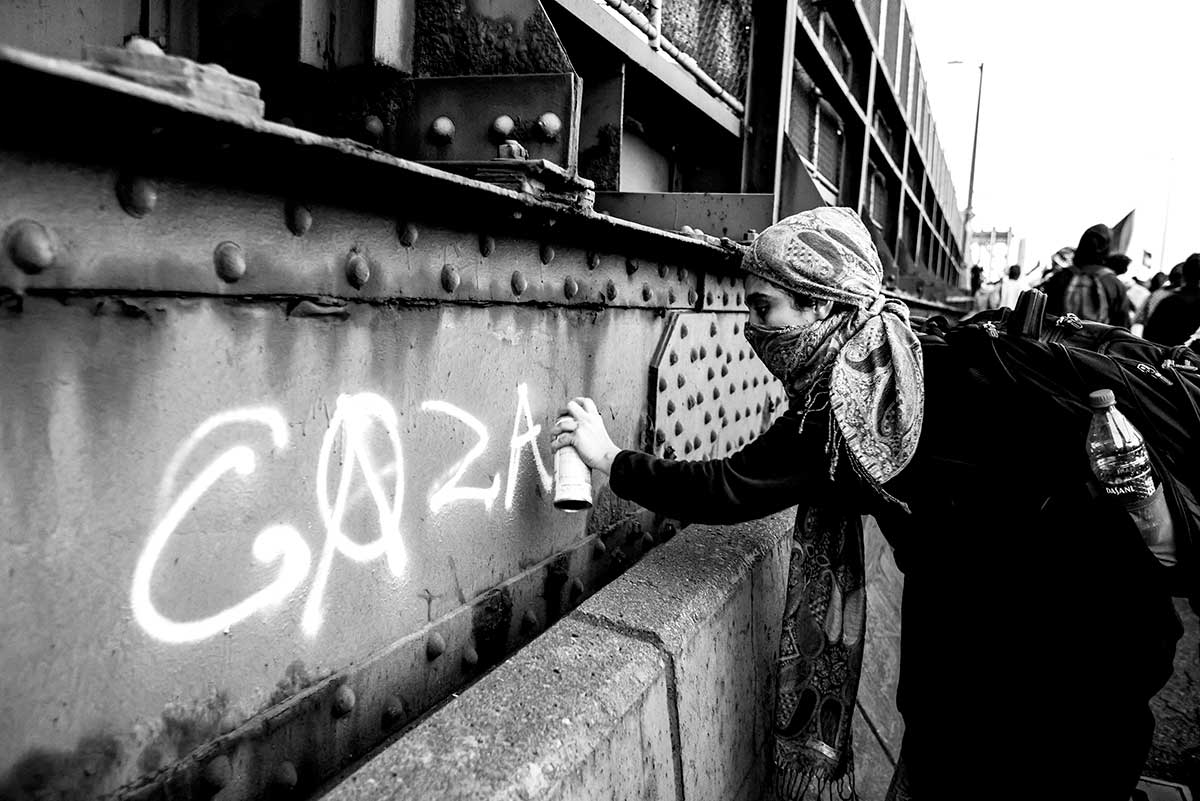
The Question
Mohammed El-Kurd
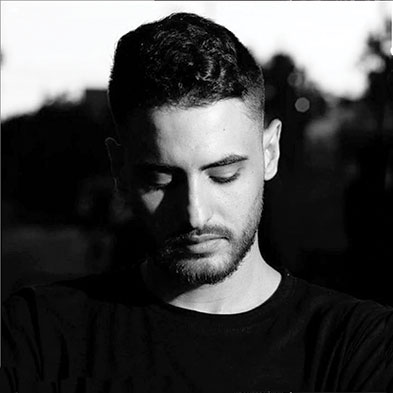
At a recent closed-door meeting in London to discuss BDS with various publishers and writers, a well-intentioned, well-known author asked me if Zionism could hold a double meaning: To some, it is a settler-colonial movement motivated by expansion and racial elimination, and to others it is a movement for Jewish self-determination. “No,” I said. “Zionism is best defined by its material manifestations—the most recent being genocide. It is irrelevant whether it could contain multitudes.” At the time, the death toll in the besieged Gaza Strip was approaching 20,000, and our martyred friend and poet Refaat Al-Areer was among the thousands yet to be retrieved from the rubble. The suggestion that I would have the patience for theoretical discussions felt profane.
Yet conversations about Palestine in the West are steered by abstractions and hypotheticals—about the meaning of Zionism, about the threat level of words, about a logistically impossible yet impossibly imminent genocide of the Jewish people. (Apparently, I am supposed to clarify that I do believe the Holocaust happened.) You almost feel as though you are the victim of an elaborate, callous joke.
The morning I sat down to write this, a nurse and journalist named Yousef Mema published photos of the decomposing corpses of Palestinians murdered in the north of Gaza—a skull, a rib cage, and foot bones protruding through jeans. They had been exposed to the harsh elements for the past 80 days, he explained, because heavy Israeli bombardment and ground incursions had “prevented paramedics from reaching the martyrs.”
Meanwhile, in another world, Zionist college students were busy decrying the threat posed by pro-Palestinian demonstrations on campus, then testifying about this threat in front of Congress, while young Palestinians were being gunned down or stabbed by white supremacists. At first, I had Norman Finkelstein in my ear, accusing these students of crocodile tears. Of feigning fear. But it cannot only be performance: despite the nukes and the promised homeland, their fear is so visceral it can conjure the Gestapo in the halls of the Ivy Leagues.
To be Palestinian today is to feel like you are caught in a fever dream—trapped in someone else’s hallucination, where the question “What happens to the settlers?” is offered with more urgency than questions about the welfare of six million stateless Palestinian refugees who are scattered around the world. It is to be interrogated about the hidden insidiousness of our chants, while Israeli politicians boast about ethnically cleansing Gaza in newspapers and interviews. It is to be shouted over, silenced, by people who claim to fear for their lives from the safety of apartments that have never been blistered by white phosphorus—that have endured nothing fiercer than a US winter—while people in another corner of the planet dig for loved ones buried beneath the rubble of demolished buildings.
Such details are not minor. In situating the Holocaust outside of history, in placing it not just in the past but in an eternal future, Zionism today has created a status quo in which the possibility of a second holocaust is given primacy over a holocaust happening in the present. I am certain some readers will find those previous lines uncomfortable or even incendiary, but that is precisely the point: Language comparing Zionists to Nazis is scrutinized—even penalized—more than the government policies and military actions that beg for the analogy to be made.
Distracting questions—“Can Zionism mean different things?”; “Is anti-Zionism antisemitism?”—feed the discursive loop that prioritizes a conjectural “day after” over the material present. But here, in the present, there are more pressing questions: What are the mental and muscular consequences of being forced to transform a taxi into a hearse? What becomes of the nurse whose shift is interrupted by the arrival of her husband’s corpse on a stretcher? What about the father carrying what remains of his son in two separate plastic bags? What happens to him after all of this death, once he is alone and away from the cameras? What kind of man will the boy carrying his brother’s limbs in a bag grow up to be?
We on the outside simply do not understand what life inside Gaza does to a person. We know the facts: The 2.3 million Palestinians in Gaza—which has been declared “uninhabitable” by the UN—have been under siege for 16 years. Two-thirds of them are refugees or the descendants of dispossessed refugees; half of them are children; and many of them have lived their entire lives under blockade, their calendars marked by routine bombardments. Sometimes these facts are produced to contextualize and historicize the violence coming out of Gaza; more often they are obfuscated to depoliticize and mystify that violence.
But in either case, neither the well-intentioned nor the ill-intentioned truly contend with the magnitude of these facts or the truth they lay bare: Gaza is a place like no other. Here is a world governed solely by its severed geography. People here live encircled by an abundance that they are owed, and yet within this world, the water is most likely undrinkable, passage is impossible, and food—like the people themselves—needs a passport. Massacres are both televised and denied. And all the while, the world’s superpowers aid and abet our annihilation—explicitly, institutionally, and materially—then berate us about the meaning of human rights and the myth of Israeli self-defense. We are, to them, an unfortunate complication of an otherwise acceptable status quo.
As long as this status quo persists, as long as Palestinians are subjected to colonial violence and erasure, as long as the people of Gaza continue to defy the genocide being waged against them, we who are living outside the concentration camp certainly can, and should, refuse indignity as a state of being, refuse to shrink ourselves and our aspirations, refuse to assuage the hallucinations of our colonizers or be silenced or shouted over. In the last three months, the world changed forever. We all should act accordingly.
Do You See What I See?
Laila Al-Arian
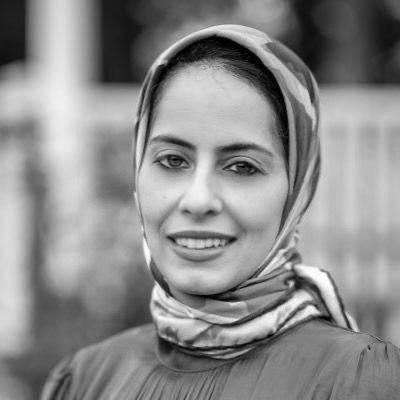
I put down my phone just before closing my eyes to sleep, a final break from the endless stream of horrific news from Gaza. The last posts I see are chilling: Palestinians in Gaza describing the ferocity of Israel’s bombing campaign, many of the posts declaring “This is the worst night” yet. Then there are the videos. The screams of terror as 2,000-pound bombs hit homes, the flares of bright orange illuminating Gaza’s night skies, and the billowing smoke that follows.
The cycle repeats as night turns into day. I reach for my phone as soon as I wake up and see posts of Gazans taking stock of the events of the previous night: who was killed, who was rescued from the rubble, who was shot by snipers while fleeing for their safety and waving a white flag.
In the videos, children shake uncontrollably, covered in dust after an air strike, silent and bewildered. The number of children killed and wounded, their limbs amputated, without anesthesia in far too many cases, is so massive that the UN has called Gaza “a graveyard for children.” Gaza is where Palestinian children go to sleep hungry, where they hold a press conference to beg the world to stop their killing, and where parents write their children’s names on their arms and legs in case they need to find them beneath the rubble.
Every time I see a video, photo, or post, I wonder if others are seeing it too—especially Americans, whose tax dollars provide much of the arms for Israel’s bombardment. Are they seeing what I’m seeing? I ask over and over again, as each day brings a new brutality that I didn’t think was possible.
Israel cut off food, water, fuel, and electricity to Gaza.
It wiped out entire bloodlines.
It stripped men and boys down, photographed, kidnapped, beat, and tortured them.
It executed 11 men in front of their families.
It killed people digging graves for others Israel had previously killed.
It killed a 12-year-old girl who was recovering in a hospital after losing her leg in an earlier air strike that killed her family.
It bombed a hospital live on Al Jazeera. It bombed so many hospitals.
It bombed churches, mosques, schools, universities, UN shelters, fishing boats, food storage sites, and bakeries for starving people and convoys of fleeing refugees.
It used white phosphorus, which causes severe burns and even penetrates through bones.
It killed dozens of journalists and even their family members.
It left premature babies to die and then shot the journalist who exposed the story of their decomposing bodies.
I know that if this were happening somewhere else, it would merit wall-to-wall coverage in the United States. Instead, much of what I learn comes from social media and independent or international news outlets.
Israel has barred foreign journalists from entering Gaza unless they are embedded with their military, but even that fact, which would provoke outrage if another country were doing it, has barely made a ripple. Instead, it has fallen on Palestinians to tell their own story—the reporters targeted and killed in record numbers, and the citizen journalists using their phones to capture displacement, starvation, injuries, and death, all evidence of war crimes for which Israel will almost certainly never be held accountable.
It’s difficult enough to see the terror unleashed on Gaza’s 2.3 million people, nearly half of whom are children. But the complicity and justification from Western countries that have lectured others about human rights for decades makes it unbearable. And then there is the gaslighting, those who deny that any of this is happening at all and claim, for instance, that a dead Palestinian baby is actually a doll.
I am consumed by my feelings—of sadness, grief, and rage—but feel guilty for dwelling on them and even for living life, eating while people are starving, drinking while they are thirsty, sleeping in a warm bed while they are bombed in theirs or sleeping outside in the cold. We Palestinians in the diaspora know that it is fate alone—decisions made by or for our grandparents—that separates us from those in Gaza who are once again enduring Israel’s brutality.
In October, I watched a video of two young brothers in the aftermath of an Israeli air strike. The older one, whose face was stained with blood, stood over his younger brother, who was lying down, his head bandaged and face and chest covered in blood. The older boy, no more than 10, was whispering to him to say the declaration of faith that Muslims say when they’re dying. This was one of countless videos of Palestinians confronted with the violent deaths of their loved ones, saying goodbye, crying over them in disbelief, and kissing their dead bodies over and over again.
These moments of horrific intimacy are filmed because those who suffer and witness them want to show the world that this really happened. But as the death toll reaches 25,000 (the number is likely much higher given the bodies under the rubble), I wonder if there is a cost to all the images we’re seeing, if they inure people to Palestinian death, if there’s no point in intruding on their most vulnerable moments, since those in power have not been moved to stop the carnage.
The day after I saw the video of the two brothers, their images still running through my mind, I asked a member of Congress if he would support the call for a cease-fire. “They’ve been fighting each other for thousands of years,” he responded. It was galling. “That’s not true,” I responded. “It’s been 75 years. My grandparents became refugees after Israel was created.” “Thousands of years,” he responded, walking away.
This level of ignorance can only come from decades of demonizing Palestinians as “human animals” and “children of darkness” to justify killing them en masse even in the face of the indisputable fact that 70 percent of those killed are children, women, and the elderly. Are they seeing what I’m seeing?
Most of the videos from Gaza show graphic horror and heartbreaking loss: a child, whose face is covered in blood, writhing and screaming in pain; a father shouting the names of his children as he searches for them under the rubble; a mother screaming in disbelief that her children were killed while they were hungry. But I have found that mundane and familiar footage of everyday life before this onslaught is haunting in its own way. In one video, a young dental school graduate named Abdallah Baghdadi sits in the back of a jeep, wearing a black baseball cap, while on vacation in Turkey, a brief respite from the weight of living under Gaza’s blockade. He is smiling, carefree, full of life. Abdallah’s grieving friend posted it after he was killed on October 30, to remember him as she knew him.
In the first three weeks of Israel’s bombardment of Gaza, I found out that my mother lost 17 members of her extended family in two separate strikes. We had never met them because of Israel’s 17-year siege of Gaza, which has cut off the tiny strip from the world and made it nearly impossible for anyone to visit. I’ve learned that it’s possible to mourn people I’ve never met, like the poet and professor Refaat Alareer, who was killed along with members of his family. Refaat was one of the founders of “We Are Not Numbers,” a nonprofit that cultivated young writers from Gaza to tell their stories to make sure they don’t become statistics. But in the face of so much relentless death, it feels daunting to make sure that each person Israel has killed does not become just a number. How long does it take to recite 25,000 names?
We even worry about the dead in Gaza, as Israel attacks cemeteries throughout the strip. I think about what will become of my late grandfather, who returned to Gaza in 2004 after living abroad as a refugee for much of his life because he wanted to die in his homeland. My grandfather survived Israeli bombardments in 2008, 2012, and 2014. But he can’t rest even in death.
What will be left for the people of Gaza when Israel finally ends its campaign of terror? It has destroyed everything that makes a place livable in its determination to end life itself in Gaza, to separate the people from the land. How does life go on when you’re surrounded by rubble and mass graves, by children who lost their limbs before they learned to walk, who lost their parents before they learned how to say their names?
Outside of Gaza, to be a Palestinian in this moment is to go through the motions of life while feeling dead inside. It feels like it should be a state of emergency, but all around us life goes on. People do their grocery shopping, gather for the holidays, and blow out their birthday candles, while we are overcome by powerlessness and grief. To be Palestinian right now is to feel betrayed by those who remain silent, whatever their reasons, and to feel gratitude and hope from those who have spoken up.
It’s not just Palestinians, though. So many people have told me that this is a life-defining moment for them that has shaped their views in profound ways. Those people have seen what I’ve seen.
Something has broken in all of us, and we will never be the same.
More from The Nation

The Fall of Syria Changes Everything The Fall of Syria Changes Everything
Retired diplomat Chas Freeman and writer Pascal Lottaz discuss what happens now that Damascus is in the hands of Hayat Tahrir al-Sham.

Netanyahu Must Be Brought to Justice. But We Can’t Stop There. Netanyahu Must Be Brought to Justice. But We Can’t Stop There.
This genocide is a massive criminal undertaking, and we must hold as many of its perpetrators accountable as we can.

My Brother Chef Mahmoud Almadhoun Died Because He Fed Gaza’s Starving Citizens My Brother Chef Mahmoud Almadhoun Died Because He Fed Gaza’s Starving Citizens
His killing by Israel sent a chilling message that no one is safe, including humanitarians who stand in the way of Gaza’s erasure.

The Underground Network Helping Gazan Refugees Survive in Egypt The Underground Network Helping Gazan Refugees Survive in Egypt
A patchwork of volunteer-run mutual aid organizations has sprung up to tackle the severe problems facing people fleeing genocide.

The Dangers of Trump’s Foreign Policy The Dangers of Trump’s Foreign Policy
Strategic incoherence and factionalism reign.
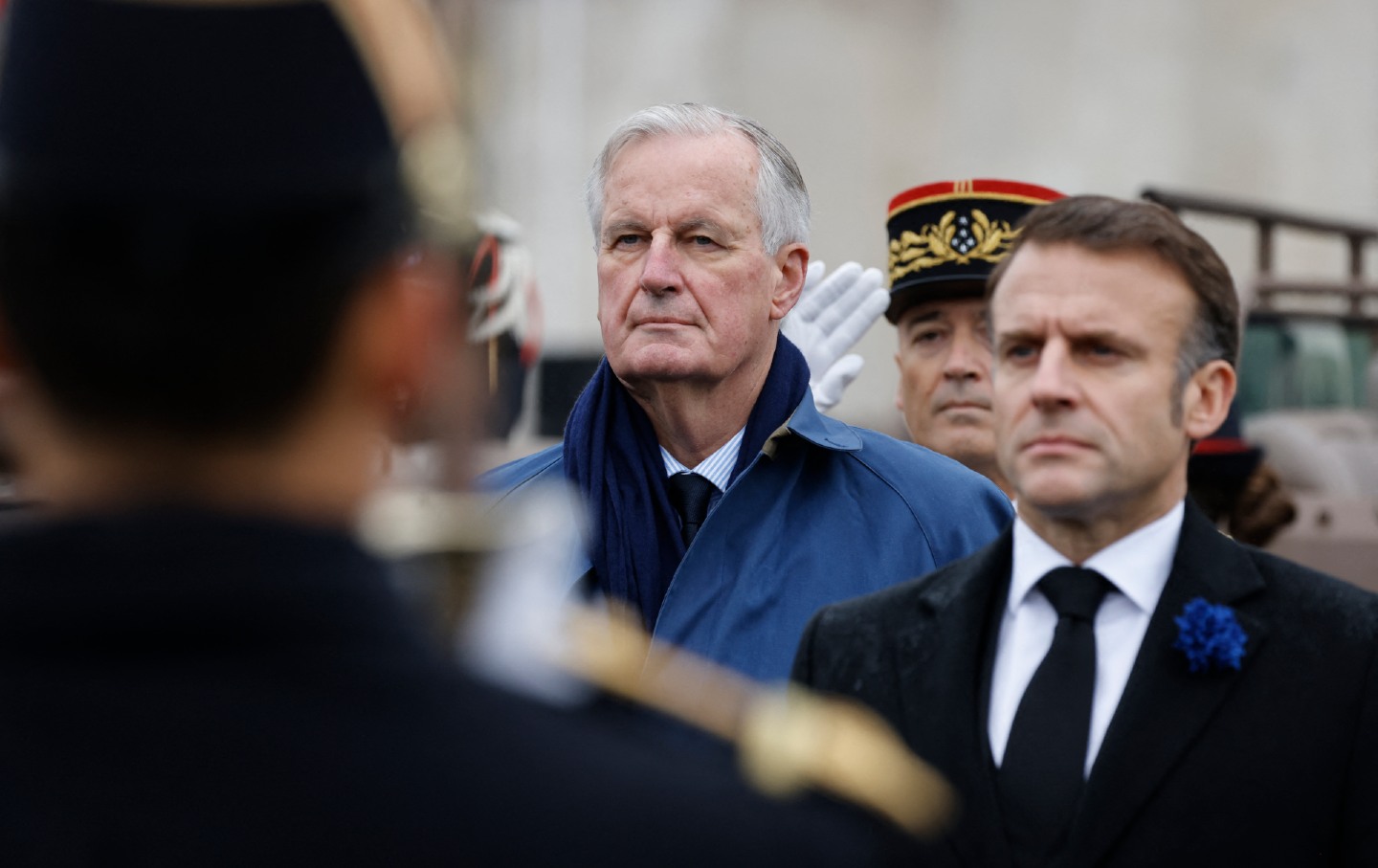
Macronism Has Died a Second Death Macronism Has Died a Second Death
The French parliament votes to oust the government.


